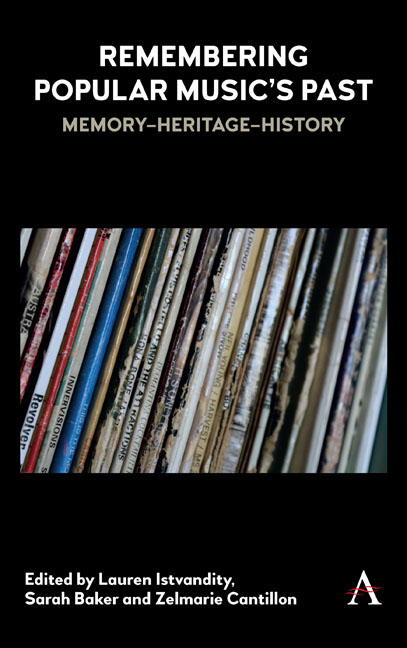Book contents
- Frontmatter
- Contents
- List of Figures
- Acknowledgements
- Chapter 1 The Precarity of Memory, Heritage and History in Remembering Popular Music's Past
- Part I MEMORY
- Chapter 2 Consuming Popular Music Heritage
- Chapter 3 ‘Back in the Day’: Experiencing and Retelling the Past as a Claim to Belong in the Current Northern Soul Scene
- Chapter 4 Resilience and Change: Popular Folk Songs in a Cultural Landscape
- Chapter 5 Remembering the Independent Record Shop: The Ordinary Affects of Leedin Records
- Chapter 6 Mean Streets as Heritage Object: Music, Nostalgia and the Museumification of Martin Scorsese
- Part II HERITAGE
- Part III HISTORY
- List of Contributors
- Index
Chapter 5 - Remembering the Independent Record Shop: The Ordinary Affects of Leedin Records
from Part I - MEMORY
Published online by Cambridge University Press: 09 July 2019
- Frontmatter
- Contents
- List of Figures
- Acknowledgements
- Chapter 1 The Precarity of Memory, Heritage and History in Remembering Popular Music's Past
- Part I MEMORY
- Chapter 2 Consuming Popular Music Heritage
- Chapter 3 ‘Back in the Day’: Experiencing and Retelling the Past as a Claim to Belong in the Current Northern Soul Scene
- Chapter 4 Resilience and Change: Popular Folk Songs in a Cultural Landscape
- Chapter 5 Remembering the Independent Record Shop: The Ordinary Affects of Leedin Records
- Chapter 6 Mean Streets as Heritage Object: Music, Nostalgia and the Museumification of Martin Scorsese
- Part II HERITAGE
- Part III HISTORY
- List of Contributors
- Index
Summary
The independent record store is a central feature in the ways popular music's past is remembered. Cult films such as High Fidelity (2000), Empire Records (1995), (500) Days of Summer (2009), This Is Spinal Tap (1984), Pretty in Pink (1986) and others all feature the record shop as an important site of youth consumption and culture. These record stores, usually staffed by young men and women, signify music's past in important ways. There has been a public lament of the ‘death of the record store’ (The Economist 2007), followed more recently by a renewed enthusiasm for record stores and specifically vinyl records (Bartmanski and Woodward 2015), rendering the independent music store as both cultural artefact and the site for sociocultural revitalization.
Forces of globalization and neo-liberalism, as well as changes in technologies –from analogue to digital –influenced shifts in the retail music industry. In Australia, small independent music stores like Leedin Records, which is the focus of this chapter, could not compete with large corporate brands such as JB Hi-Fi, Sanity Records or big box stores like Kmart, and many independent record stores shut their doors by the early 1990s. Yet their place as vital to remembering popular music's past is an important piece of the narratives of change, progress and technology that are central to popular music's distribution and consumption.
Remembering, in the context of this chapter, is not through halls of fame, or tribute shows, or the ‘gilt-edged symbolic capital’ that Roberts and Cohen (2014, 284) note in their study of commemorative plaque schemes in England, but rather through a focus on the more ‘ordinary affects’ (Stewart 2007) of friendship, fun and growing up, as well as disappointments, and the movement of time through do-it-yourself (DIY) community archives. The ‘community archive’ at the heart of this chapter is reliant on the ‘active and ongoing involvement of members of the source community […] making accessible their history on their own terms’ (Stevens et al. 2010, 60, original emphasis).
- Type
- Chapter
- Information
- Remembering Popular Music's PastMemory-Heritage-History, pp. 55 - 68Publisher: Anthem PressPrint publication year: 2019



